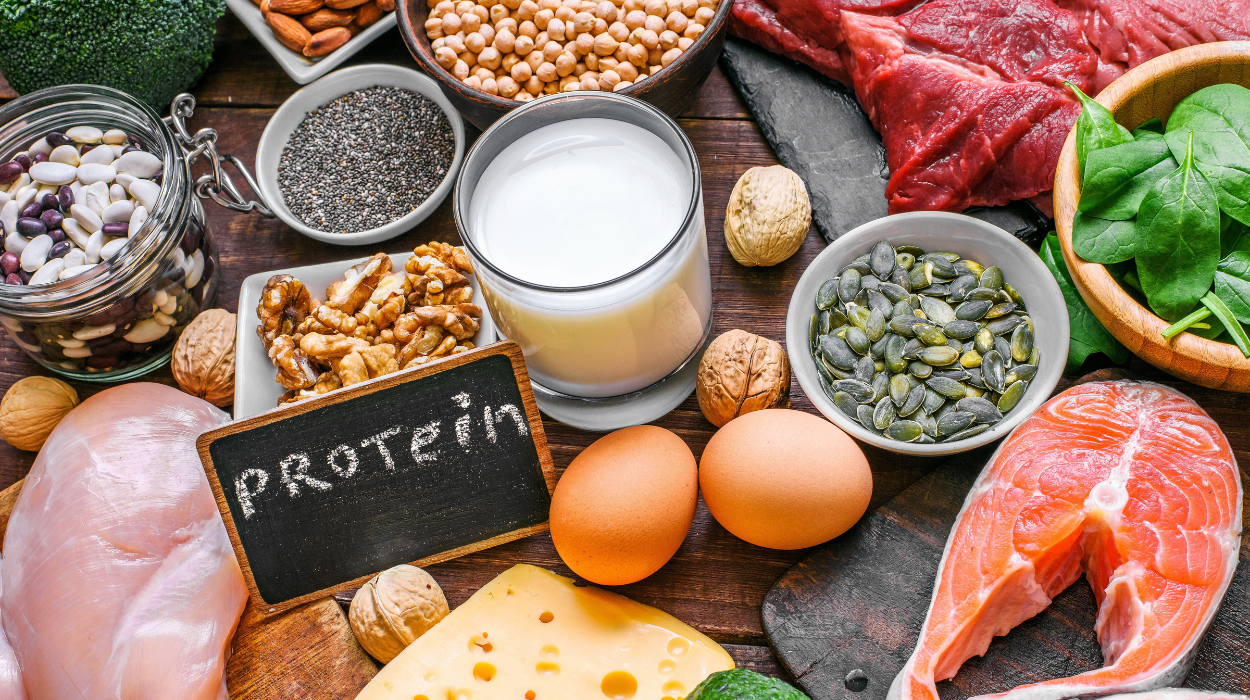Losing weight can be a challenging journey, especially for women. With so much misinformation, it’s hard to know how much protein for weight loss is optimal.
Protein is an essential macronutrient that helps build muscle, curb hunger, and boost metabolism. But you may be wondering the specifics, such as, “How much protein should I eat to lose weight?” or “How much protein per day to lose weight for a woman?”
This article will provide research-backed guidance on protein needs for weight loss, the benefits of protein for fat loss, and how protein facilitates weight reduction.
We will also cover the potential side effects of consuming too much protein, the best high-protein foods to eat, and the best protein shakes for weight loss. Read on to discover tips for following a protein-rich nutrition plan.
How Much Protein For A Woman To Lose Weight?
The recommended protein intake for a woman depends on how active she is on a daily basis. If you are sedentary, aim for 1.2-1.5 grams of protein per kilogram of body weight. If you are moderately active, aim for 1.6-1.8 grams per kilogram. If you are an athlete or in the gym regularly, try to consume around 2 grams per kilogram.
How Much Protein Per Day To Lose Weight For A Woman?

The amount of protein to lose weight for a female can range based on her body weight, activity level, and calorie deficit. Here are general protein recommendations for weight loss based on research.
- For sedentary women, aim for 1.2 to 1.5 grams[1] of protein per kilogram of body weight per day. For example, if you weigh 150 pounds, try to consume 85 to 110 grams of protein daily.
- Moderately active women can consume up to 1.6 grams per kilogram of body weight or a maximum of 1.8 grams per kilogram.
- For highly active women and athletes, an intake of up to 2.0 grams[2] per kilogram of body weight is needed to support increased protein needs from challenging workouts. Some athletes may even consume up to 2.4 grams per kilogram.
- When cutting calories for weight loss, increase protein to 30% of total calories.
- Spread out protein intake[3] evenly throughout the day over three to four meals or snacks.
- Consume a quality protein source each time.
- Use a how much protein per day to lose weight calculator to find your target based on your current body weight and activity level.
- Adjust your protein intake as needed as you lose weight.
Benefits Of Protein In Weight Loss

There are several benefits of protein in weight loss. Higher protein diets specifically promote fat reduction and lean muscle retention when cutting calories to lose weight.
Increased Satiety & Appetite Control
Consuming adequate amounts of protein leads to greater feelings of satiety and fullness than low-protein diets.
Protein is the most satiating macronutrient per calorie, more than fat and carbohydrates, the other two macronutrients. Research shows higher protein meals[4] suppress the hunger hormone ghrelin while increasing levels of appetite-regulating hormones like CCK, GLP-1, and PYY. This leads to increased satiety and appetite control.
The satiating effects of consuming more protein can make it easier to stay within the calorie deficit required for weight loss. When you feel more full and your hunger is more controlled in this way, it’s easy to adhere to a reduced-calorie plan.
Preservation Of Metabolically Active Lean Muscle Mass
When in a caloric deficit for weight loss, the body breaks down a mix of fat mass and lean muscle to provide energy.
Consuming higher amounts of protein while cutting calories helps minimize the loss of lean muscle mass.[5] Adequate protein intake signals the body to preserve muscle by providing amino acids needed to sustain lean tissue when in a calorie deficit.
The thermogenic metabolism-boosting effects of having more muscle play a key role in long-term weight management.
Muscle tissue is metabolically active, burning calories around the clock. When losing weight, retaining calorie-burning lean muscle makes it easier to keep weight off.
Higher protein intake preserves muscle[6] by providing amino acids to maintain structural integrity and performance of muscle fibers while losing fat.
Greater Thermogenic Effect
The human body spends more energy digesting and metabolizing protein-containing foods than fats or carbohydrates. This is known as the thermogenic effect.
Research shows the thermic effect of protein[7] is around 20-35% of calories. Meanwhile, the thermic effect of carbs is only 5-15% of calories consumed.
For example, 100 calories of a high-protein food may burn 25 calories during digestion and absorption. So, the net energy from that protein is only 75 calories. On the other hand, 100 calories of carbohydrates may only burn 10 calories, resulting in a net energy of 90 calories.
Several factors account for the higher thermogenic effect of protein foods. Protein has a more complex structure than carbs or fat, requiring more cellular machinery and energy for digestion. The kidneys also utilize energy to filter protein breakdown products and metabolize amino acids after digestion.
The more significant thermogenic effect of protein foods boosts overall energy expenditure.[8] The thermogenic impact supports greater daily calorie burning and expenditure to facilitate weight loss when eating.
How Protein Helps You Lose Weight
Here’s a look at the key mechanisms behind how adequate protein facilitates weight loss:
- Appetite Reduction: Protein is the most satiating macronutrient. Feeling fuller for longer supports lower calorie intake and makes it easier to limit foods to avoid that impede weight loss, such as processed sugary drinks, chips, and fast food.
- Increased Thermogenesis: Your body burns more energy digesting protein foods, supporting a greater overall daily calorie burn.
- Muscle Preservation: Maintaining metabolically active lean muscle mass boosts resting metabolism to aid fat loss.
- Improved Body Composition: Higher protein diets support fat loss while retaining calorie-burning lean muscle mass.
- Hormonal Optimization: Protein helps regulate appetite hormones like ghrelin and leptin for hunger control.
- Stabilized Blood Sugar: Protein slows digestion, keeping blood sugar balanced.[9] This prevents energy crashes and sugar cravings.
- Optimized Nutrient Intake: Higher protein meals often lead to increased intake of fiber and micronutrients.
- Lower Calorie Density: Replacing some fats or carbs with protein can lower the overall calorie content of your diet.
Side Effects Of A High-Protein Diet
While protein is important for weight loss, excessive amounts can potentially lead to adverse effects in some individuals.
These adverse effects include the following:
- Dehydration: Some data show that high protein intake can increase fluid losses[10] because you are eating fewer carbohydrates,[11] which tend to keep more fluid in your body. Ensure you’re drinking enough water to counteract this potential effect.
- Digestive Issues: Increasing protein gradually to avoid problems like diarrhea or constipation is important.
- Kidney Strain: Those with kidney disease should consult a doctor before increasing protein intake.
- Liver Issues: High protein may stress the liver. Those with liver disease need medical guidance on specific protein needs.
- Interaction With Medications: Eating protein can change the effects of certain medications like blood thinners.
To avoid potential side effects, make sure to drink plenty of fluids when consuming a higher protein intake, and get kidney and liver function tests routinely. Also, increase protein gradually as tolerated to achieve a healthy diet and optimal digestion.
High-Protein Foods
To easily achieve a higher protein diet for weight loss, focus on incorporating these high-protein foods into your daily diet.
- Lean Meats: Chicken, turkey, lean beef.
- Fish: Salmon, tuna, tilapia, cod, trout.
- Eggs: Whole eggs and egg whites.
- Dairy: Greek yogurt, cottage cheese, high protein milk.
- Protein Powders: Whey, casein, plant-based powders.
- Beans & Legumes: Lentils, black beans, kidney beans.
- Nuts & Seeds: Peanuts, almonds, pistachios.
- Soy Products: Tofu, tempeh, edamame.
When grocery shopping, read labels and aim for at least 15 to 20 grams of protein per serving. A wide variety of lean protein sources is ideal for variety and micronutrient intake.
Conclusion
Research shows higher protein diets of up to 30% of total daily calories can enhance weight loss.[12] To answer the question “How much protein do I need to lose weight?” use your current body weight and activity levels to calculate your optimal daily protein target based on proven ranges.
While very high protein diets may have drawbacks, moderate increases in protein offer metabolic and psychological benefits for weight reduction. Tracking current body weight and activity levels allows you to determine an optimal protein intake target for your weight loss goals as a woman.
Emphasizing lean proteins at meals and snacks supports satiety, muscle building, and an elevated metabolism to help shed pounds.
With the information provided in this guide, you now have a solid understanding of optimal protein intake ranges. You can also understand the benefits and which high-protein foods to leverage for successful weight loss as a woman.
Remember that everyone’s protein needs vary. For more personalized guidance, consult with a registered dietitian.
Frequently Asked Questions
For most women, 100 grams of protein per day isn’t excessive. Optimal protein needs vary based on body weight, activity level, and caloric intake. Going above 2.2 grams per kg body weight may not provide any additional benefits.
The best amount of protein for muscle gain and losing fat is 1.2-2.0 grams of protein per kg of body weight. Spread out protein intake — aiming for 25 to 30 grams per serving — to maximize muscle protein synthesis.
Potential signs of excessive protein include increased thirst, digestive issues like diarrhea or constipation, changes in kidney function, elevated uric acid levels, and liver enzyme abnormalities.
For most women, consuming around 30 grams of dietary protein in a meal or snack is a reasonable target and not excessive. Aim to meet total daily protein targets through adequate intake spread over meals.
 Evidence Based
Evidence Based
